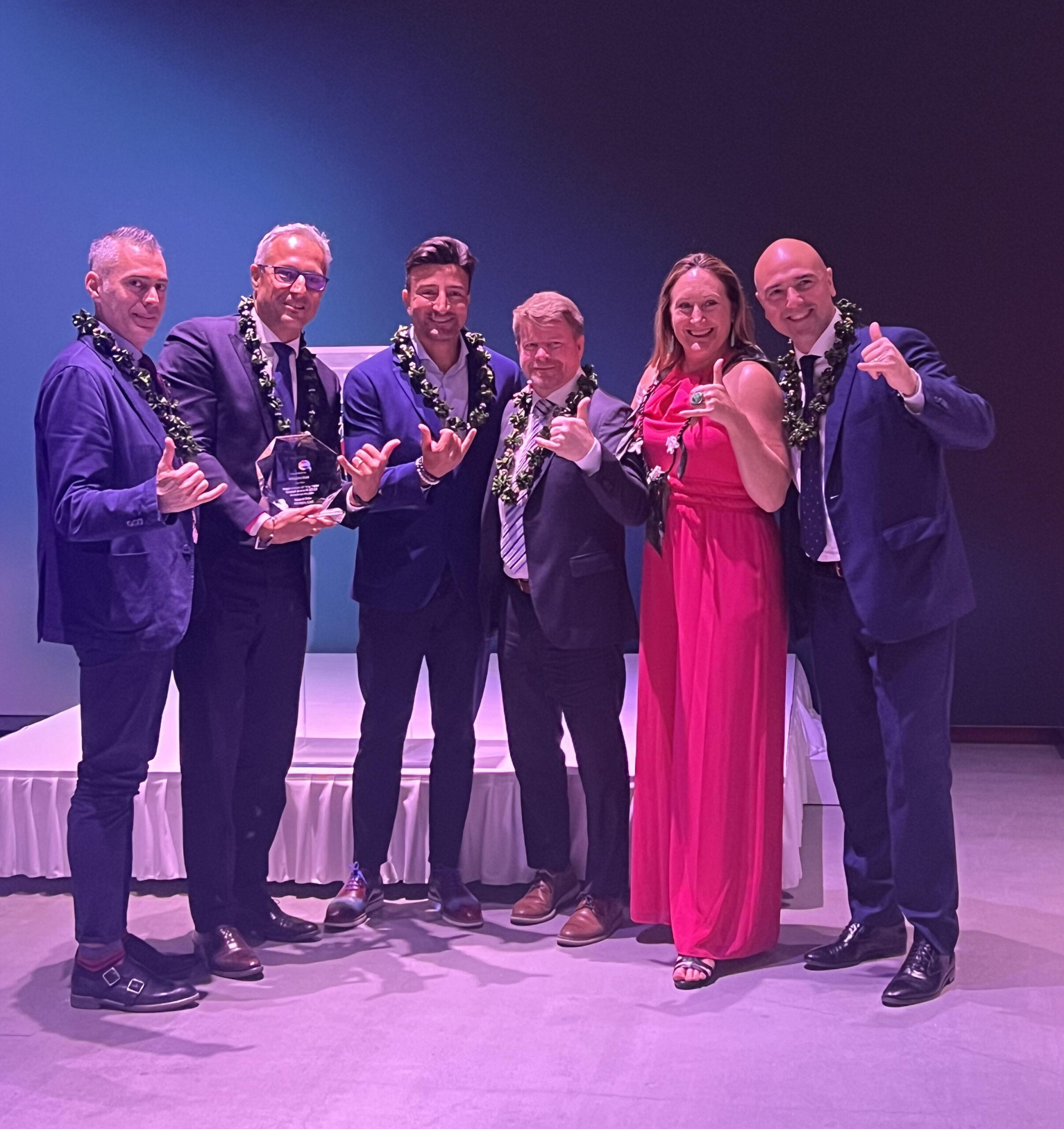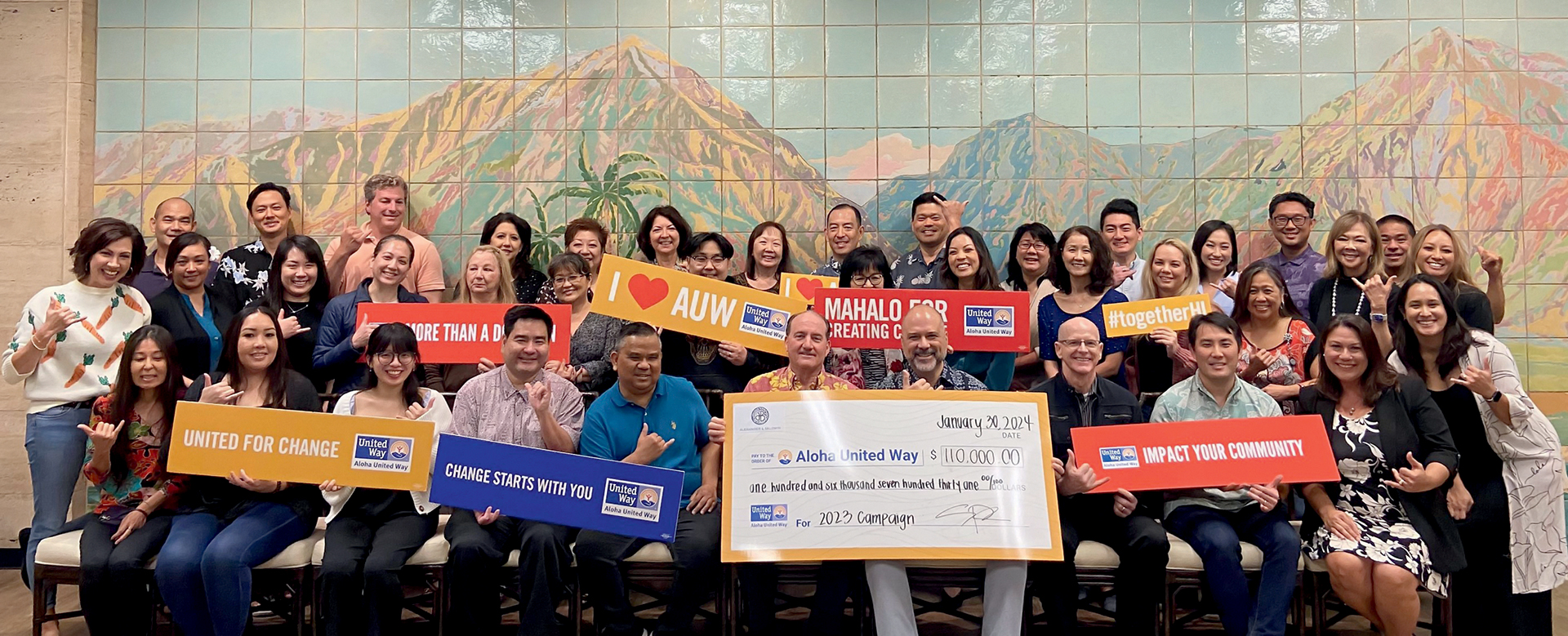As long as there’s a need to get materials from point A to point B, a functional logistics industry is required. It’s even more vital for a place like Hawai‘i, located in the middle of the world’s largest ocean.
Assuming the materials aren’t manufactured or grown here in the islands, they need to be transported here from elsewhere. Cargo ships and aircraft carry goods across the ocean, planes distribute them between islands and trucks deliver them to their final destinations.
The last several years have brought unique challenges to the local construction industry. To understand how logistics currently fares amidst these pitfalls, Building Industry Hawaii speaks to some of the shipping and transportation companies that service Hawai‘i either by bringing the materials to the islands or getting them to destinations across the state, or both.
QUESTION: What are some of the trends, positive or negative, that you are currently seeing?

Bernie Valencia
BERNIE VALENCIA,
MATSON INC.
IN HAWAI‘I VICE PRESIDENT OF SALES:
Demand in the Hawai‘i trade is relatively stable. As in most years, some segments are up and others are down a little. For example, retail and hospitality-related business continues to be a little soft, whereas construction-related shipments are up.

Lori Modelski
LORI MODELSKI,
PINERIDGE FARMS INC.
OPERATIONS MANAGER
One of the positive trends that I am seeing is an increase in federal spending on both military facilities and for statewide infrastructure projects.
One of the negative items I’ve noticed, which is not so much a trend, [are the] attempts by the legislature to remove the Public Utilities Commission (PUC) as the regulatory entity for commercial transportation. This move would negatively impact everyone’s business.
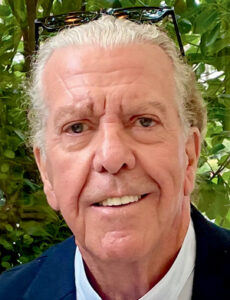
Paul Skellon
PAUL SKELLON,
PACIFIC AIR CARGO
DIRECTOR OF MARKETING, COMMUNICATIONS
AND PUBLIC RELATIONS
Let’s get the bad stuff out of the way first: I think the most negative trend at the moment continues to be as a result of overcapacity in the air cargo industry.
Many new entrants joined the industry when they saw the huge airlift demand during COVID. This was a very shortsighted view and understanding of how the markets perform historically, and it resulted in the pain the industry has felt over the past 12 months.
With the post-COVID return of belly-hold cargo space in the passenger airline market, this has also impacted cargo volumes for the specialized cargo carriers, such as Pacific Air Cargo.
On the positive side, Pacific Air Cargo has multiple interline agreements with several of the Asia-Pacific airlines for whom we manage their cargo ground handling, and in many cases, we transport a portion of the cargo they offload in Honolulu, which is destined for the West Coast (LAX).
This business had completely dried up during COVID when no passenger services were operating into Hawai‘i. We welcome the return and the steady growth of that sector of our business.
What are the current challenges that
your company is facing?
VALENCIA: The biggest challenge is decarbonizing our business. Matson has goals to achieve a 40 percent reduction in fleet greenhouse gas emissions by 2030 and to achieve net zero Scope 1 emissions by 2050, and it will take substantial investments to get there.
We’ve invested over a billion dollars in recent years upgrading our fleet and hub terminal here in Honolulu, and last year committed another billion dollars in additional fleet upgrades that will be coming online in the next few years.
(Editor’s Note: Scope 1 emissions are direct greenhouse gas emissions from sources controlled or owned by a company.)
MODELSKI: Almost everyone in the industry is having problems with skilled trades labor. Pineridge specifically is challenged with trying to find enough skilled, experienced CDL A drivers and skilled heavy diesel mechanics to cover our work.
Increasing costs for insurance and medical coverage is also an issue. Medical costs have risen an average of 3 percent to 7 percent over the last five years.
SKELLON: Probably the most significant challenge we continue to face is the very high price of fuel. With conflicts raging in different parts of the world and higher winter demand for fuel, global oil prices have increased significantly and that of course flows through to the price of jet fuel, too.
In addition to high fuel prices, we have been challenged by labor shortages in Hawai‘i, again a direct result of a changed market environment and work practices post-Covid. I am happy to say, however, that in recent months that situation has stabilized for us, and I believe that’s largely as a result of our very competitive employee benefits packages, a fun and inclusive culture, and the opportunities we offer for growth and progression in the industry.
We are an organization which is very focused on the wellbeing and personal development of our team members.

Pineridge Farms provides hauling services for shipping containers, construction equipment and materials. PHOTO COURTESY PINERIDGE FARMS INC.
What bright spots do you see in the year ahead?
VALENCIA: The U.S. economy continues to be resilient and consumer confidence seems to be on the rise. We are hopeful that inflation continues to recede and tourism continues to recover.
SKELLON: For the past 24 years, we have successfully navigated, grown and performed well throughout the frequent array of external challenges that impact aviation more than any other industry.
I see no change to those external forces continuing to impact us from time to time in the future, but we are very nimble, very experienced and we are highly motivated to remain successful and to provide a stable, safe and healthy environment in which our people can flourish and grow.
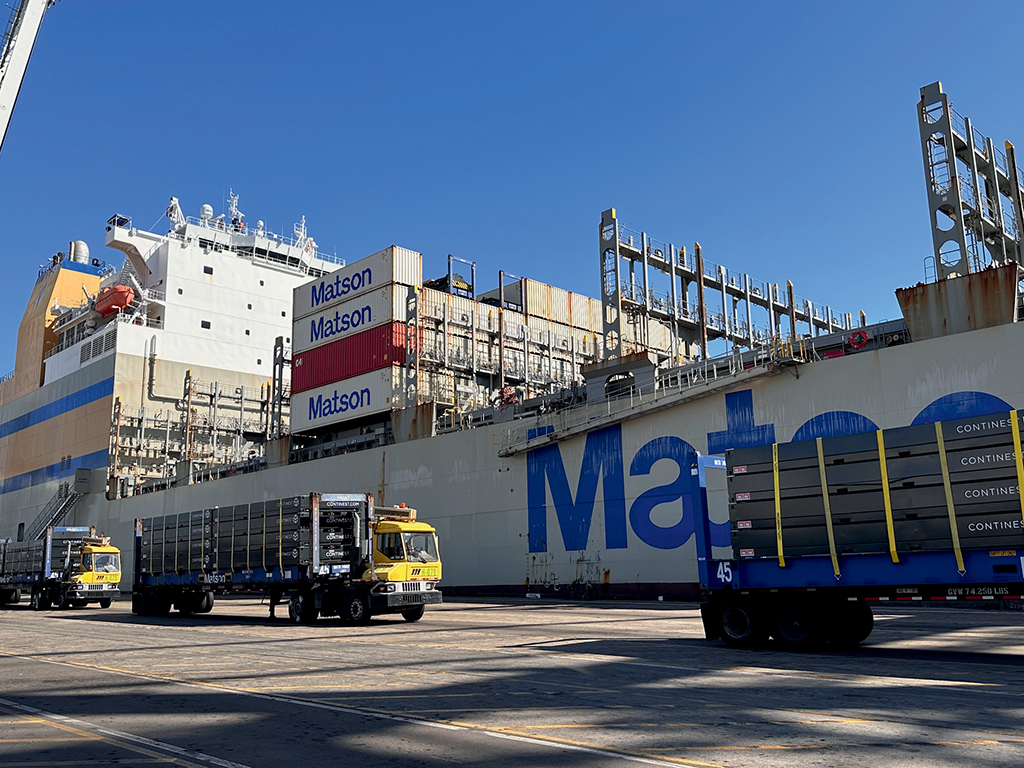
Matson has been serving the islands for over 140 years. PHOTO COURTESY MATSON
To what extent do supply chain issues remain a concern? How are you navigating those waters (so to speak)?
VALENCIA: So far, supply chain disruptions elsewhere in the world — conflict in the Red Sea, slow-downs in the Suez and Panama canals — have not affected our services in the Pacific.
The hope is that these are short-term challenges and that they don’t result in upward pressure on consumer prices.
MODELSKI: Parts, equipment, trucks are slow to be produced and shipped. Shipping costs are totally inflated.
SKELLON: Certainly, some supply-chain issues remain and can impact the timely delivery of spare parts for the aircraft and for our essential ground-handling equipment, but the logistics industry is working hard to return the markets to pre-pandemic performance or better.
We have been fortunate that strong, long-lasting relationships with our suppliers have helped us minimize the impact to our operations.
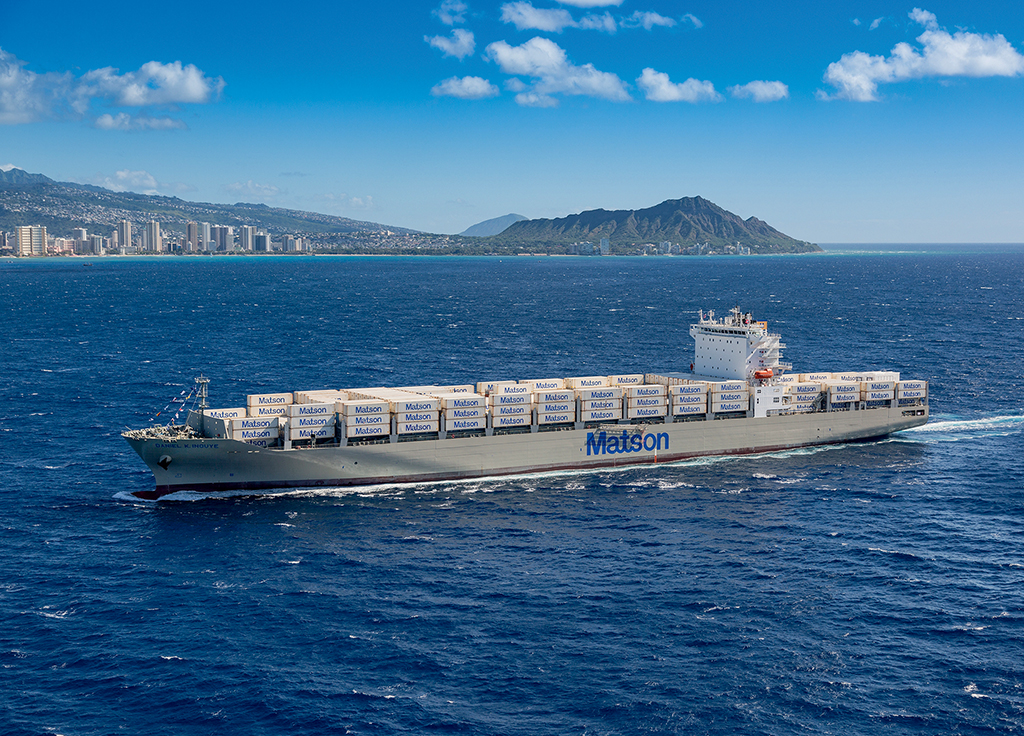
Matson’s first Aloha Class container ship, the Daniel K. Inouye, approaches Honolulu Harbor. PHOTO COURTESY MATSON
How has the tragedy on Maui affected operations?
VALENCIA: For the first month after the fires, we chartered an extra barge and made several extra sailings to Maui over and above our weekly arrivals. We had a team of people working overtime in August and September through the initial phase of response, and daily meetings to manage and respond to the outpouring of support and a steady flow of inquiries and requests from government agencies, customers and members of the general public.
While inquiries from the general public have slowed to only a few every week, we continue to work closely with Maui County, state and federal agencies working on Phase 2 of the recovery and expect to continue this work for as long as we’re needed.
SKELLON: First and foremost, it broke our hearts … but not our spirits! As a company, we did what we always do best — we pulled together to help each other and our community.
Pacific Air Cargo’s philanthropy operation, PAC Gives Back, sprang into action and together with many of our partners and team members we were able to deliver vital relief supplies to the affected communities on Maui in the immediate aftermath of that tragedy.
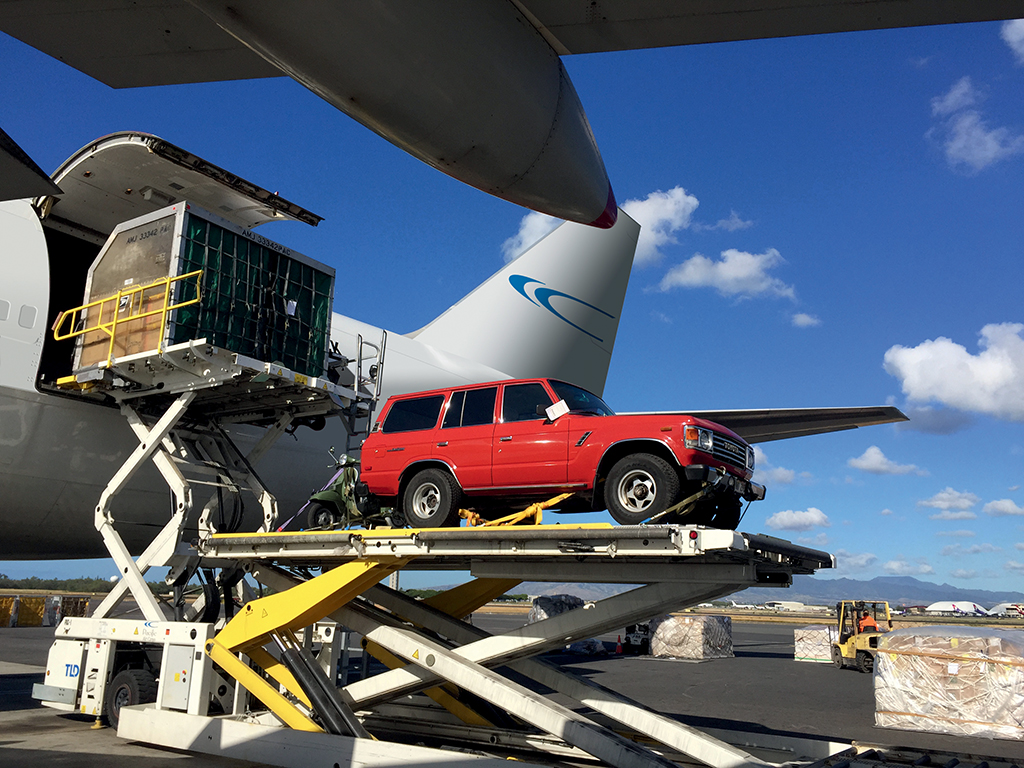
An SUV and a scooter are loaded onto a Pacific Air Cargo aircraft. PHOTO COURTESY PACIFIC AIR CARGO
Are there other economic factors or pressures that are impacting the industry and/or your operations?
VALENCIA: With companies like ours around the world driving demand for no- or lower-carbon fuels as part of the global effort to combat climate change, there is a lot of work going into developing alternatives fuels.
These new fuels are expected to be more expensive in the early stages of this global transition away from carbon-based fuels, so we expect fuel prices to continue a general rising trend in the near-to-medium term.
SKELLON: The high cost of living and of doing business in Hawai‘i certainly impacts business competitiveness. This environment has existed for a long time and is unlikely to change anytime soon, so it forces businesses like ours to be vigilant about managing costs and to be innovative in order to be more efficient and productive.
We do, however, see exciting new growth opportunities through new and expanded partnerships, interline agreements, collaborations and through the growth of our ad-hoc full- and part-charter business throughout the Pacific.
Anything else you’d like to add?
VALENCIA: Matson has had an important role in Hawai‘i’s economy for more than 140 years, and we continue to invest in our core services to Hawai‘i so that we can continue to provide the most reliable, safe and environmentally friendly services into the future.
SKELLON: The world of aviation is very cyclical, and we know that current market challenges will in time give way to bright new opportunities.
Hawai‘i’s geographic location means we’ll always need quick, efficient and modern air cargo links to the U.S. mainland and to our Pacific Rim partners. That’s good for us.
As we look ahead in 2024, we’ll be increasingly focused on service excellence and continued investment in our people and in the tools they require to deliver uncompromising service, so we are very optimistic about our future in both the near and longer term.


